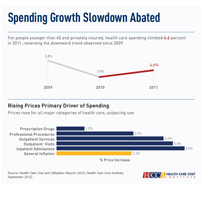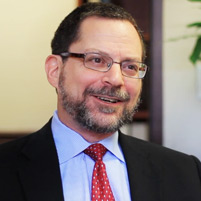Analyzing Health Care Data
Video: Gaynor comments on the 2010 HCCI report

Click to view larger chart

Martin Gaynor
Meeting a need for better health care data, the Health Care Cost Institute (HCCI) is providing a first-ever comprehensive look at people in the United States with private health insurance."It's hard to make good policy decisions if you have data that are inaccurate or out-of-date," said Carnegie Mellon University's Martin Gaynor, chairman of the HCCI's governing board and E.J. Barone Professor of Economics and Health Policy at CMU's Heinz College. "HCCI is a private effort in the public interest to build the infrastructure we need to generate the knowledge and understanding to improve health care for all Americans."
Launched in September 2011, the institute was established with an aim of becoming the nation's leading source of information on U.S. health care costs.
"There's been this gap in information because a lot of what we know about health care comes from the Medicare program," explained Gaynor. "But two-thirds of Americans are privately insured, and so we're trying to fill that gap in information so we can make better decisions and improve things for all Americans."
The reports released by the institute are based on de-identified, Health Insurance Portability and Accountability Act (HIPAA) compliant data sets from approximately six billion health insurance claims for about 40 million individuals provided by three of the nation's largest health plans — Aetna, Humana and UnitedHealthcare.
The payers have agreed to share their data with HCCI to help researchers study what influences the use and cost of health care services in the United States.
According to its latest analysis, Health Care Cost and Utilization Report: 2011, U.S. health care spending grew at a faster pace than expected in 2011.
Prices rose for all major categories of health care — hospital stays, outpatient care, procedures and prescriptions — outpacing an uptick in the use of many of these services. Prices rose fastest for outpatient care.
Another key finding: spending on children's health care rose much faster than spending on other age groups.
"Prices continue to be the main culprit for rising health care costs," said HCCI Executive Director David Newman. "If we are really going to get health care spending under control, we have to better understand why those prices are rising and the implication those increases have for the U.S. health care budget."
Gaynor says HCCI data will be made available for noncommercial, nonpartisan, scientific research. It will be used by external researchers to understand what is driving health care spending.
"Researchers will be looking at the impact of aging, the effects of the business cycle, the impacts of the recession, hospital pricing and the underlying determinants of hospital pricing and price trends," he said.
He added, "The best and brightest minds in this country are going to be looking at this treasure trove of data. And that will benefit all of us: policymakers, employers, providers, insurers and the population of the United States as a whole."
Related Links: Heinz College | Health Care Cost Institute
